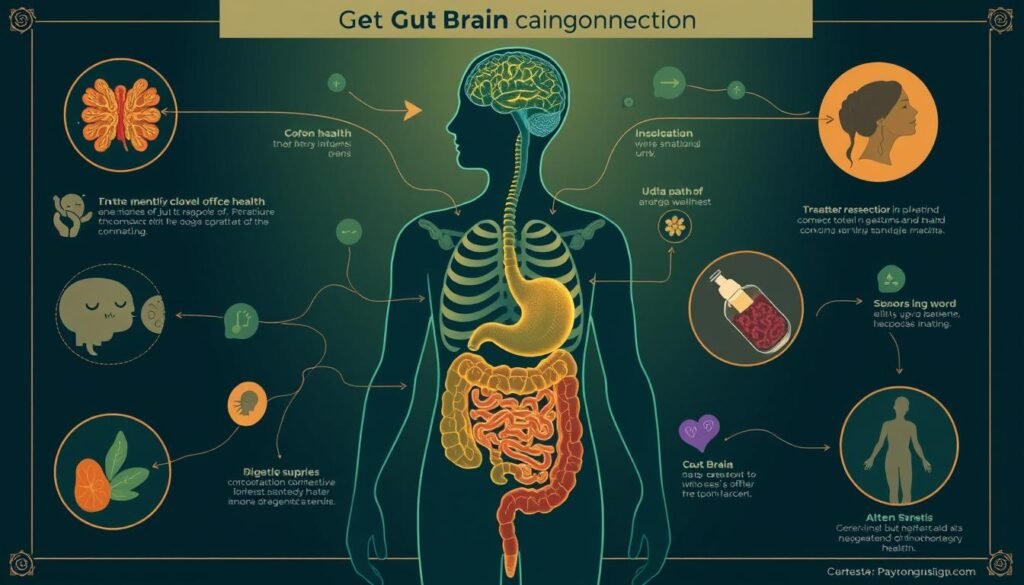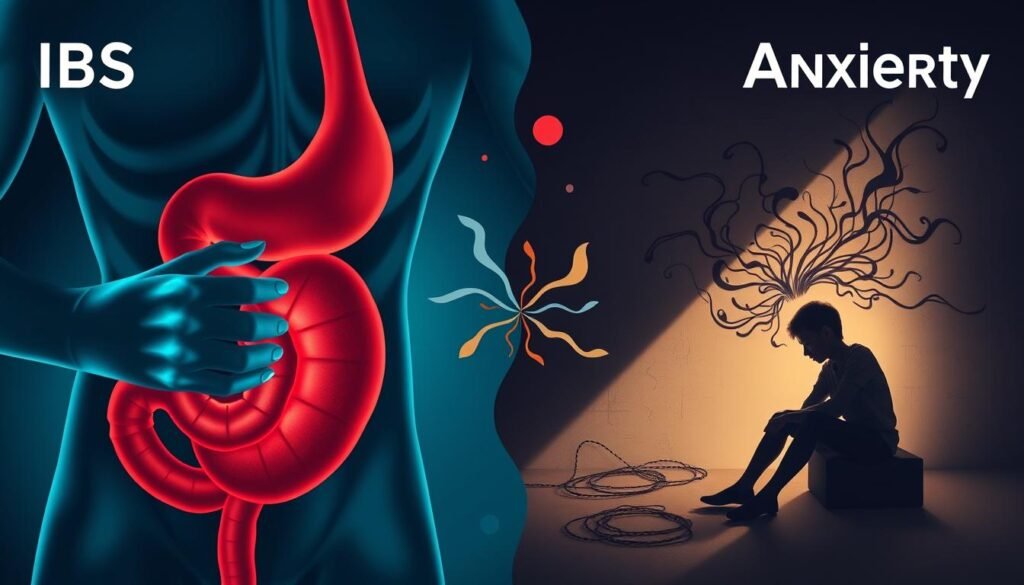Surprisingly, up to 60% of people with Irritable Bowel Syndrome (IBS) also have anxiety. This high number shows how anxiety and IBS are closely linked. Mental and gut health are connected. Recent studies show they have common genetic links and affect each other.
For those dealing with both anxiety and IBS, it feels like a tough cycle. Stress makes gut problems worse, which then increases anxiety. To better life quality, one must look at techniques like stress management, changing food habits, and getting help when needed.
In this guide, we’ll talk about the gut-brain connection. We’ll see how IBS and anxiety share symptoms. And, we’ll give useful tips for handling both. Readers will learn from options like cognitive behavioral therapy (CBT) to changing their diet. This guide offers detailed help for overcoming anxiety and IBS challenges.
Key Takeaways
- Up to 60% of IBS patients also have anxiety disorders.
- IBS symptoms can worsen anxiety, making it a tough cycle.
- Effective stress management helps ease anxiety and IBS symptoms.
- Cognitive Behavioral Therapy (CBT) is a good treatment for both issues.
- Adjusting your diet, like more fiber and probiotics, helps with IBS and anxiety.
- It’s important to get medical advice for severe anxiety or gut issues.
- Support groups offer useful ways to cope with IBS and anxiety.
Understanding the Connection Between Anxiety and IBS
The link between anxiety and IBS deeply affects those suffering from these conditions. Nearly 15% of people have irritable bowel syndrome (IBS), with many also battling high anxiety levels. Over 38% of IBS sufferers report anxiety issues, showing a clear link between IBS symptoms and mental health.
Anxiety doesn’t cause IBS but can make symptoms worse. This leads to a cycle where anxiety spikes IBS symptoms, which then increases anxiety. Studies show that IBS patients often face higher rates of anxiety and depression, highlighting a strong connection between the two.
IBS patients also show higher rates of psychiatric issues like anxiety, depression, and eating disorders than the general population. During the COVID-19 pandemic, both IBS and non-IBS groups felt more anxious. However, the IBS group was significantly more affected.
This complex relationship underlines the need for treating both IBS and mental health disorders together. By understanding how they’re connected, we can work towards better treatments. This is essential for improving life for those suffering from IBS and anxiety.
The Gut-Brain Connection Explained
The gut-brain connection shows how our stomach and brain talk to each other. This link is key for keeping us healthy. It affects our digestive health and can play a part in conditions like IBS. Our gut has over 100 million neurons, earning it the title “second brain.” These neurons control digestion and react to our emotional stimuli. So, feeling stressed or anxious might make IBS worse.
This link can make a cycle where tummy troubles and emotions keep affecting each other. Up to 76% of patients saw their IBS symptoms cut in half with gut-directed hypnotherapy. Even five years after treatment, 81% of people still felt better. These results show how connected our mind and body are.
Studies are looking into how the gut can influence our thinking, metabolism, and risk for diseases like type 2 diabetes. Some doctors prescribe antidepressants for IBS, showing that treating both mind and mood can help. This proves how important the gut-brain connection is for those with IBS.

| Factor | Impact on IBS | Effects on Emotional Well-being |
|---|---|---|
| Neurons in the Gut | Regulates digestion and responds to stress | Can worsen anxiety and emotional distress |
| Gut-Directed Hypnotherapy | 76% achieve symptom reduction | Improvement in emotional quality of life |
| Antidepressants | Helps calm IBS symptoms | Addresses mood disorders |
| Research on Probiotics | Potential for improving gut health | May positively affect mood |
Common Symptoms of IBS and Anxiety
Irritable bowel syndrome (IBS) is the top gut issue worldwide. It brings symptoms like stomach pain, bloating, diarrhea, and constipation. These IBS symptoms can deeply affect daily activities and how we interact with others.
Anxiety often goes hand in hand with IBS, making things feel worse. People with anxiety might have racing thoughts, get easily irritated, and feel their stomachs churn. The link between IBS symptoms and anxiety symptoms shows how stress can make both issues more severe.

The tie between anxiety and stomach trouble isn’t random. Studies reveal that 44% of folks with IBS also battle anxiety. Plus, a staggering 84% deal with depression. This shows a deep connection between our emotions and digestion.
Facing stomach issues can make someone more anxious. This, in turn, can worsen IBS symptoms, creating a cycle of discomfort. It’s key to notice these cycles. By understanding what triggers anxiety-related IBS, one can look for treatments that help both the mind and gut get better.
How Stress Management Can Alleviate IBS Symptoms
Stress management is key in easing IBS symptoms. Studies show that better mental health improves digestion. This can ease the belly pain IBS causes. Doing activities like yoga, running, or swimming helps too. They regulate the gut, easing discomfort.
Many wellness methods help with symptoms. Acupuncture and acupressure make the mind and muscles relax. This lessens belly pain. Practices like meditation and hypnosis also offer deep relaxation. They help manage IBS symptoms without meds or diet changes.
Psychotherapy is good for those with anxiety or depression which can make IBS worse. There’s proof that stress affects IBS severity. Higher stress means worse symptoms, impacting daily life and treatment.
Breathwork can boost well-being. It lowers cortisol and fights negative feelings. Even short breathwork sessions help. They can improve mood and lower anxiety.
Exercise and mindfulness, like CBT, are effective against IBS symptoms. Mindfulness reduces bowel distress in studies, proving its value for gut health. By controlling stress, people see a big drop in IBS symptoms and a better life quality.

Dietary Changes to Manage IBS
Thoughtful dietary adjustments can greatly ease IBS symptoms. The low FODMAP diet is highly advised. It helps pinpoint and cut out certain carbs that upset the stomach. This diet includes a testing phase to find out which foods trigger symptoms. About 75% of IBS sufferers find major relief by following this diet.
Adding fiber to your diet is key. Adults need 22 to 34 grams of fiber daily, say the Dietary Guidelines for Americans, 2020–2025. Choose soluble fiber, like in beans, oats, and some fruits. It’s better for IBS than insoluble fiber. Foods with soluble fiber, such as psyllium and oat bran, boost gut health.
Drink plenty of water and avoid foods that worsen IBS. High-FODMAP foods, like certain fruits, veggies, dairy, and wheat, are often culprits. Gluten may trouble you even without celiac disease. Eating less than 20 parts per million of gluten helps.
Probiotics can also improve gut health. They restore the gut’s natural bacteria balance. Yogurt, kefir, and pickled veggies are great probiotic sources. Eating them regularly helps your digestive system work better.
Considering these dietary moves can improve your life with IBS. Try the low FODMAP diet, eat more soluble fiber, and include probiotics. These steps can lower your symptoms and make everyday life better. They offer a tailored way to manage IBS well.
Probiotics: The Importance of Gut Health
Probiotics are key for good gut health, especially for IBS and anxiety sufferers. The balance of gut bacteria affects both digestion and mood. Studies show that more probiotics can ease IBS symptoms like cramps and bloating. Probiotics also help with anxiety by improving gut health.
Lactobacillus and Bifidobacterium are good bacteria that boost gut health. They help balance immune response and lower inflammation, easing IBS symptoms. A healthy gut means a healthy mind, thanks to the gut-brain link.
- About 11.2% of people have IBS.
- People with IBS are three times more likely to feel anxious or depressed.
- Probiotics can rebalance gut bacteria, easing symptoms.
- Better gut health can improve digestion and mental well-being.
| Probiotic Strain | Benefits for IBS | Effects on Anxiety |
|---|---|---|
| Lactobacillus | Reduces gastrointestinal discomfort, enhances stool consistency | May improve mood and anxiety levels |
| Bifidobacterium | Alleviates bloating and constipation, balances gut flora | Supports emotional well-being, potentially lessening anxiety |
| Saccharomyces | Helps reduce diarrhea and promotes digestive health | Could contribute to a more stable mood |
In summary, probiotics are crucial for gut health and mental wellness. For those with IBS and anxiety, probiotics can be a great help. Ongoing research on the gut-brain connection may reveal even more benefits of probiotics.
Mindfulness Techniques for Reducing Anxiety
Mindfulness techniques are key in reducing anxiety, especially for those with Irritable Bowel Syndrome (IBS). People with IBS often face anxiety. It’s vital to use stress relief methods. Practices like meditation keep you in the present, stopping the cycle of anxiety that makes GI problems worse.
Adding deep breathing, visualization, and yoga brings big benefits. These mindfulness methods clear your mind and help with the stress’s effects on your stomach. Regularly meditating reduces stress, anxiety, and depression for those with IBS. This leads to better overall health.
- Deep Breathing: Promotes relaxation and helps regulate stress response.
- Progressive Muscle Relaxation: Reduces tension by alternating between tensed and relaxed muscle groups.
- Meditation: Encourages a calm state of mind and reduces anxious thoughts.
- Yoga: Combines physical movement with mindful breathing techniques, enhancing both mental and physical health.
Using these methods helps greatly with reducing anxiety and improving IBS symptoms. Making a routine with mindfulness and self-care is key. It helps you deal with anxiety and digestive issues better.
Cognitive Behavioral Therapy for IBS and Anxiety
Cognitive Behavioral Therapy (CBT) is a strong method that tackles both irritable bowel syndrome (IBS) and anxiety. It aims to change negative thoughts, helping people see the link between anxiety and IBS symptoms. Since nearly 35 million Americans suffer from IBS, using CBT to adjust behavior can greatly improve their lives and health costs.
Studies show that CBT has lasting benefits for those with IBS. It boosts emotional well-being and helps patients handle stress better. Through CBT, people with IBS gain tools to deal with their condition, improving their gut health and emotions. One in three individuals may see big improvements after trying CBT, making it a key treatment option.
Therapists work with patients for about four to ten sessions. They use methods like exposure therapy and relaxation to deepen understanding of IBS. Since 95% of serotonin is in the gut, it’s clear why emotions affect IBS. CBT stands out for those looking for long-term relief from IBS and anxiety. To learn more about CBT and how it helps, check out more here.